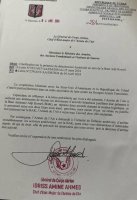The US risks losing its military presence in another African country as the government of Chad sent a letter threatening to end a critical security agreement, according to four US sources, a move that threatens to cede more US
influence in the region to Russia.
In a letter sent to the US defense attaché last week, Chadian officials threatened to cancel the Status of Forces Agreement, or SOFA, which determines the rules and conditions under which US military personnel can operate in the country. While the letter did not directly order the US military to leave Chad, the officials told CNN that it said all US forces would have to leave the French base in N’Djamena.
The letter specifically mentioned the US Special Operations Task Force (SOTF) at the base, an important hub for US Special Operations Forces in the region, two of the sources said. But the task force is not the only contingent of US military personnel at the base, as all US service members in Chad are located in N’Djamena.
Instead, the letter was from the Chief of Air Staff of Chad, Idriss Amine, the intelligence sources said, an unusual way to transfer such a significant message. The letter was typed in French, one of Chad’s official languages, and written on Amine’s official letterhead.
The letter was not sent through official diplomatic channels, according to one of the officials, which is the standard way to handle these issues. The two sources cautioned that letter could be a negotiation tactic by the government of Chad to get a new agreement that better favors their interests.
The exact number of US troops in the country is not clear but one US official said there are fewer than 100 troops there.
CNN has asked Chad’s government for comment.
The move comes just a month after the military government of neighboring Niger ended its agreement with the US military that allowed American personnel to operate in the country.
One of the sources told CNN that the leadership in Chad is following the example set by Niger, attempting to use an opportunity to extract more concessions from the US. But the official said Chad’s threat to terminate the SOFA agreement blindsided US officials.
The move comes at a critical time for US interests in Africa, as American officials have warned that Russian influence is expanding across the continent.
In Niger, a senior airman filed a formal whistleblower complaint, warning that the US ambassador to Niger and the defense attache had “intentionally suppressed intelligence” in an attempt to “maintain a façade of a great country-to-country relationship.”
The complaint alleges that the approximately 1,100 US troops in Niger are being “held hostage” since no new troops can come in to replace those currently deployed. “It is clear that the country of Niger does not want a permanent military presence in their country and they have informed us that we need to leave,” the airman wrote.
The Washington Post
first reported on the whistleblower complaint.
In a statement to CNN, Marine Corps Gen. Michael Langley, head of US Africa Command, said some diplomatic clearances for military flights “have recently been denied or not responded to, which has forced extended deployments in some cases.”
“US Africa Command senior leaders continue to work closely with the State Department and others to ensure US forces deployed to Niger have the support and services they need,” Langley said. A US military official said AFRICOM remains committed to conducting intelligence activities, and that the Defense Department and AFRICOM “are informed daily of the situation on the ground in Niger.”
CNN has reached out to the State Department for comment.
The complaint comes as the Nigerien state broadcaster announced one week ago that Russia had delivered military equipment, including the latest generation of air defense systems, to Niger.
Langley, told the Senate Armed Services Committee in March that Russia is “trying to take over central Africa as well as the Sahel” at an “accelerated pace.”
“(A) number of countries are at the tipping point of actually being captured by the Russian Federation as they are spreading some of their false narratives across Libya and from a strategic answer piece, access and influence across the whole Maghreb,” Langley said. “That is NATO’s southern flank. We need to be able to have — maintain access and influence across the Mahgreb, from Morocco all the way to Libya.”
In a separate hearing with the House Armed Services Committee last month, Langley said Central African countries were “in a dilemma,” needing developmental assistance from countries like Russia and China but balancing those needs against “risks to national sovereignty.”
“In this region, the stakes are high,”
Langley said.
Langley visited Chad in January this year alongside AFRICOM’s senior enlisted advisor, Sgt. Maj. Michael Woods. While in the country, Langley met with Chadian military leaders including Gen. Abakar Abdelkerim Daoud, Chad’s Chief of Staff of the Armed Forces, according to
an AFRICOM press release at the time.
Langley said in the release that AFRICOM “remains dedicated to building enduring partnerships with Chad and other African nations.”
This story has been updated with additional reporting.
CNN’s Jake Tapper contributed reporting.



